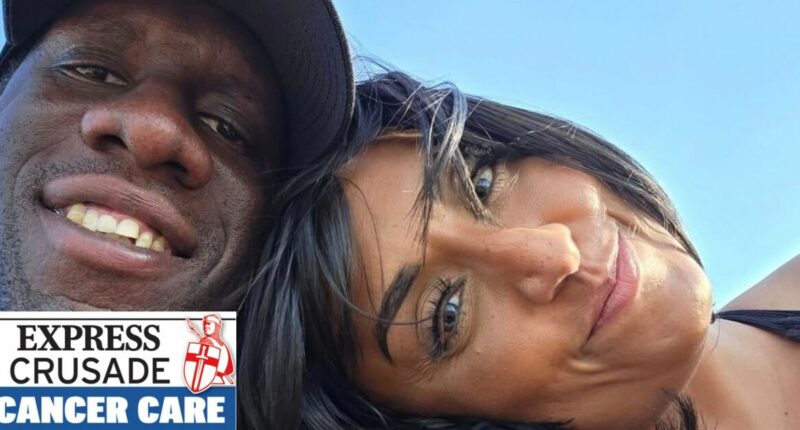Share this @internewscast.com
Up until January 2025, I led a healthy and active lifestyle as a 45-year-old, engaging in daily runs, weightlifting, and Muay Thai training. I was eagerly planning my wedding for May and excited about the future with my fiancé, Marlon. Despite this, I was experiencing frequent infections, fatigue, and night sweats, which I attributed to perimenopause. Then, my neck suddenly swelled one morning. Initially suspecting mumps, blood tests revealed a far more serious condition—tumours in my neck. I was diagnosed with acute lymphoblastic leukaemia and was admitted to the hospital immediately. We faced the uncertainty of whether it was terminal, shifting from wedding planning to arranging my will and funeral plans.
The diagnosis felt like the ground vanished beneath us. A cancer diagnosis and chemotherapy take a severe toll on mental health. The uncertainty of it being terminal, plus enduring painful treatments with no success guarantee, is daunting. The physical agony of bone marrow biopsies and lumbar punctures, hair loss altering my appearance, losing mobility, self-care challenges, and the looming threat of death all weighed heavily.
The initial rounds of chemotherapy were unsuccessful, and I eventually developed cancer in my brain, impairing motor skills and leaving me feeling disconnected from both mind and body. I spent the next half a year in hospital undergoing chemotherapy.
All my hair, including eyebrows and lashes, fell out, and I suffered from a bloated, inflamed belly (chemo belly). Neuropathy in my legs and feet compounded my mobility issues. From a state of strength and health, I became disabled, sometimes requiring assistance just to dress or stand.
I went from feeling pretty to being bald, with a pot belly and bent over in pain from walking. My identity and self-esteem were shattered.
I made efforts to stay optimistic during treatment, but nothing truly prepares you for its effects on mental health and self-image. Honestly, the physical pain and journey were overwhelming at times, making me wish to surrender. This desire instilled feelings of guilt and shame.
I withdrew from others, feeling misunderstood. My family couldn’t grasp my pain. They encouraged positivity, but maintaining a positive outlook felt impossible. The hurt was compounded when some friends distanced themselves from me.
They didn’t know what to say or how to deal with my condition, so they stopped contacting me, leaving me feeling abandoned and rejected. All I needed were friends to listen to me, without judgement or trying to convince me to do things or be a certain way.
That’s why, along with blood cancer charity DKMS, I’m supporting the Daily Express Cancer Care campaign – during Blood Cancer Awareness Month in September and beyond.
I’m so thankful for my Christian faith, for my husband Marlon and for the friends and family that stuck by me, visited me in hospital and regularly checked in on me to make sure I’m okay.
So, if you know someone who’s going through a cancer diagnosis or chronic illness, don’t underestimate the difference you can make by just being there, by listening and being a safe space for them to talk openly about how they feel.
And remember, it’s okay to cry, it’s okay to be angry, or to wallow in self-pity. Just don’t stay there. I had to keep moving and take it one day at a time. There are good days and there are bad days. And that’s okay – tomorrow is a new day.











